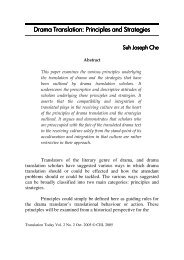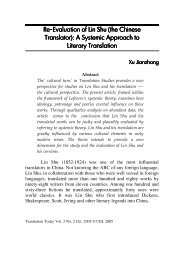Translating Literary Texts Through Indian Poetics - National ...
Translating Literary Texts Through Indian Poetics - National ...
Translating Literary Texts Through Indian Poetics - National ...
Create successful ePaper yourself
Turn your PDF publications into a flip-book with our unique Google optimized e-Paper software.
152 T.R.S. Sharmaspecially when the receiving language happens to be alien, and notcognate.Now a word is to be said about the necessary orientation of thetranslator, for he is virtually dealing with two cultures. When itcomes to his readers, it is not enough if he brings an alien text totheir proximity, it is essential that he carries/transposes his readersinto the alien culture through his rendition. Furthermore, there areone or two open questions regarding the role of the translator:Should a translation bear the imprint of the translator, and the tracesof the source language? How do you translate ancient classics? Canmodern idiom do justice to ancient classics and the cultures theyrepresent? The classics, as we know, get translated time and againin the idiom of every age with the new demands of readers. Thetranslator in this context feels the compulsion to decide on the rightregisters and idiom that his contemporary readers would expect tofind in his translation.Having said all this, one should concede that there is aninherent symmetry at the core of translation. For we cannot get theoriginal by translating back from the received language. Thetranslator, effecting, though, an 'intercultural mediation, isessentially a linguistic amphibian working with two differentmedia. He stands midway between dualities, culturally,linguistically.The relation between the original and the facsimile is theineliminable relation that the translator, therefore, needs to positbetween the signified and the signifier. The signifiers of a literarytext, as it is well known, are often subject to centrifugal forces ofmeaning. To constrain and arrest therefore the play of key signifiersfrom the inescapable dissemination, all the four categoriesdescribed above offer a conceptually integrated frame, which, whengrasped by the alert translator, can be seen as functioningsynchronically in the text so as to ensure that the identity of theoriginal is preserved in the rendition. Furthermore, what is involvedin the rendering is the constant manoeuvring between distanciationwhich the original text thematises through its cultural moorings andthe proximity the translator enjoys with the receptor language. Inthe final analysis every translation (especially when an alien
<strong>Translating</strong> <strong>Literary</strong> <strong>Texts</strong> <strong>Through</strong> <strong>Indian</strong> <strong>Poetics</strong> 153ianguage is involved) becomes a homology, seeking some kind ofidentity in essential difference. Otherwise both the source andreceiving languages have different histories, cultures, and varyingrhythms of growth.Now let us acknowledge that there is a crucial if somewhatintriguing aspect to the act of translation: It is a collaborationbetween the original author and the secondary translator, acollaboration which, ironically enough, results in the erasure of theoriginal and its rein scription in the receiving language. Think ofTolstoy and Dostoevski: Their mighty Russian souls come throughwith their agonies and ecstasies in Constance Garnet's Englishtranslation! So do Sophocles and Aristophanes, in Gilbert Murray'stranslation, erasing for us the source language. It is not the sourcetherefore but the simulacrum which precedes, as Jean Baudrillardinsists. Consequently, the simulacrum is the real, for the Real reallydoes not exist anymore-not, anyway, in the cyberspace of ouruniverse! If you still insist that all translations are failures, they are,surely, fascinating failures!ReferencesBarthes, Roland 1975 The Pleasure of the Text, New York: HiIl&Wang.Baudrillard, Jean 1994 Simulacra and Simulation, Ann Arbor: TheUniversity of Michigan Press.O'Neill, Thomas 1980 Maya in Shankara, Delhi: MotilalBanarsidas.Schechner, Richard 1993 The Future of Ritual: Writings on Cultureand Performance, London: RoutledgeSteiner, George 1975 After Babel: Aspects of Language andTranslation, London: OUP.Venuti, Lawrence (Ed) 1992 Rethinking Translation, New York:Routledge.
















